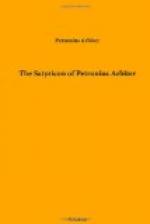“Where lies the fault then? Parents ought to be sharply reprehended, who will not have their children come on by any strict method; but in this, as in all things, are so fond of making a noise in the world; and in such haste to compass their wishes, that they hurry them in publick e’er they have digested what they have read, and put children e’er they are well past their sucking-bottle, upon the good grace of speaking, than which even themselves confess, nothing is greater: Whereas if they would suffer them to come up by degrees, that their studies might be temper’d with grave lectures; their affections fashion’d by the dictates of wisdom; that they might work themselves into a mastery of words; and for a long time hear, what they’re inclined to imitate, nothing that pleas’d children, wou’d be admir’d by them. But now boys trifle in the schools, young men are laugh’d at in publick, and, which is worse than both, what every one foolishly takes up in his youth, no one will confess in his age. But that I may not be thought to condemn Lucilius, as written in haste, I also will give you my thoughts in verse.
“Who ere wou’d with
ambitious just desire,
To mastery in so fire an art aspire,
Must all extreams first diligently
shun,
And in a settled course of vertue
run.
Let him not fortune with stiff greatness
climb,
Nor, courtier-like, with cringes
undermine:
Nor all the brother blockheads of
the pot,
Ever persuade him to become a sot;
Nor flatter poets to acquire the
fame
Of, I protest, a pretty gentleman.
But whether in the war he wou’d
be great,
Or, in the gentler arts that rule
a state;
Or, else his amorous breast he wou’d
improve
Well to receive the youthful cares
of love.
In his first years to poetry inclin’d,
Let Homer’s spring bedew his
fruitful mind;
His manlier years to manlier studies
brought,
Philosophy must next imply his thought.
Then let his boundless soul new
glories fire,
And to the great Demosthenes aspire.
When round in throngs the list’ning
people come,
T’admire what sprung in Greece
so slow at home
Rais’d to this height, your
leisure hours engage
In something just and worthy of
the stage;
Your choice of words from Cicero
derive,
And in your poems you design shou’d
live,
The joys of feasts, and terrors
of a war,
More pleasing those, and these more
frightful are,
When told by you, than in their
acting were:
And thus, enrich’d with such
a golden store,
You’re truly fit to be an
orator.”




